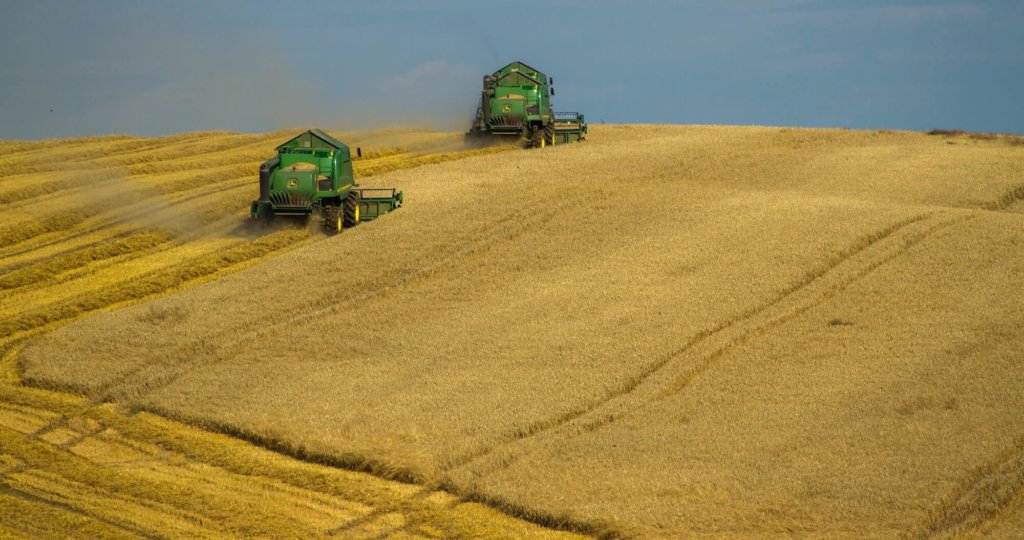The exponential growth of the world’s population correlates to a stark rise in the demand for food production and an unprecedented opportunity for agribusiness companies. According to the Organization for Economic Co-operation and Development (OECD), global agricultural production is expected to increase at an annual rate of 1.5 per cent.
To meet this challenge, agribusiness companies are innovating. Their efforts take the form of artificial intelligence (AI) and remote sensors in the field, drones for crop monitoring, ever more potent or targeted chemical solutions and of course, the genetic modification of plants and animals.
The world’s largest agribusinesses are developing methods to feed the world’s seven billion mouths while engaging with the sensitive food politics of the 21st century. Here is a list of the top ten agribusiness companies, two of which are family-owned:
10. BASF
Country: Germany
Revenue (2018): US$6.8 billion
Number of Employees: 115,490
Primarily a chemical company, this German-based conglomerate is a significant player in the agribusiness sector. BASF is one of the world’s leading suppliers of fungicides, herbicides and insecticides. Their leading chemical technology is used by golf courses, sports turf companies and in forests and greenhouses around the world.
BASF has also invested significant time and resources in researching nutrigenomics, the study of nutrients’ effects on human genes. In 2016, BASF opened a new crop protection technology centre in Limbergerhof, Germany. This state-of-the-art facility allows the company to conduct controlled product testing in actual farming conditions.
9. Yara International
Country: Norway
Revenue (2018): $12.9 billion
Number of Employees: 16,757
Yara International, founded more than a century ago in 1905, is a Norwegian company that specialises in nitrogen chemicals primarily for use in agriculture.
Headquartered in Oslo, the company is involved in every step of the process, from producing and distributing nitrogen chemicals to innovating new formulas.
8. Syngenta AG
Country: Switzerland
Revenue (2018): $13.5 billion
Number of Employees: 28,704
Syngenta AG is a Swiss company focussed on chemical treatment production and seeds. Its chemical division, which dominates sales, has five main product lines: selective herbicides, non-selective herbicides, fungicides, insecticides and seed care. Sygenta’s seed production can be divided into three lines: corn, soya and a collection of other field crops and vegetables.
At the beginning of the decade, Syngenta entered the biofuel business when it released the corn trait Enogen, designed to reduce water and energy consumption during the process of corn’s conversion into ethanol. As of June 2018, Enogen is used at more than 30 ethanol plants around the world.
7. Nutrien (Formerly Agrium Inc. and PotashCorp)
Country: Canada
Revenue (2018): US$19.6 billion
Number of Employees: 20,300
Agrium Inc. is one of the world’s leading producers and suppliers of agricultural nutrients such as nitrogen, phosphate, potash and sulphur-based fertilisers. The company was founded as Cominco Fertilizers in 1931 and changed its name to Agrium in 1995. On January 1, 2018, Agrium merged with the Canadian company PotashCorp. Together, they are the world’s largest producer of potash and second-largest producer of nitrogen fertiliser. The resulting company, Nutrien, has its headquarters in Saskatoon, Canada.
The company’s main areas of operation are North America, South America and Australia. They have 29 production facilities in North America and Trinidad, more than 1700 distribution touchpoints in North America and just under 1,600 retail outlets worldwide.
6. CNH Industrial NV
Country: The Netherlands
Revenue (2018): US$29.7 billion
Number of Employees: 64,625
CNH Industrial is most well-known as a manufacturer of tractors and other agricultural equipment. It operates 12 different brands including Case and New Holland. The company is also a leading manufacturer of heavy-duty construction equipment. CNH Industrial, though founded in the Netherlands, operates out of London and their parent company, Exor, is owned by the Agnelli family.
Their global operations span 66 manufacturing plants and 54 research and development centres in 180 countries. In a move to incorporate green technology into their products, FPT Industrial unveiled the Cursor 13 NG natural gas engine in 2017, still the most powerful natural gas engine on the market today.
5. Deere & Company
Country: USA
Revenue (2018): US$38.4 billion
Number of Employees: 74,000
The name John Deere is synonymous with tractor and field equipment. The company manufactures a vast array of agriculture equipment including tractors, combines, harvesters and cotton pickers. Their current catalogue is a testament to the companies incredible expansion from the blacksmith John Deere’s initial business repairing farm tools like pitchforks and shovels.
Deere & Company also makes smaller equipment for agriculture and home care such as lawn mowers, commercial mowers, cutters and shredders, speciality tractors and front-end loaders for tractors. More recently, the company has had a significant impact in the field turf sector.
4. Bayer AG
Country: Germany
Revenue (2018): US$46.7 billion
Number of Employees: 116,998
Bayer is the German conglomerate and pharmaceutical company responsible for Aspirin. However, Bayer is also one of the world’s major players in crop science. Today, Bayer’s agro division boasts more than 35 research sites and 175 breeding sites globally.
In 2016, corporate restructuring made Bayer CropScience one of three main divisions of Bayer AG, which are required to report directly to the head of the company. That same year, Bayer announced US$60 billion plans to purchase Monsanto. That deal was approved in 2018 on the condition Bayer sells its seed and herbicide businesses to BASF.
3. Archer Daniels Midland Company
Country: USA
Revenue (2018): US$64.341 billion
Number of Employees (2016): 32,300
Designated the most admired food-production company by Forbes magazine from 2009-2011, Archer Daniels Midland (ADM) is one of the most influential agribusiness companies in the world today. With its headquarters in Chicago, Illinois, ADM has more than 270 plants and 420 crop procurement facilities, which process grains and oilseeds into food and beverage, nutraceutical, industrial and animal feed products.
In recent years, ADM expanded the scope of its operations and now boasts a significant agricultural storage and transportation division.
2. DowDuPont
Country: USA
Revenue (2018): US$85.97 billion
Number of Employees: 98,000
DowDuPont is the world’s largest chemical company in terms of total sales. The product of a merger between two of the agribusiness industry’s leading players, Dow Chemicals and Dupont, the company became a single entity on August 31st, 2017. As part of the ongoing restructuring, plans are in place to form three main branches under the parent company. These three branches include Corteva Agriscience, the agricultural division; Dow, the materials science division; and Dupont, the specialty products division.
In terms of agriculture, much like the other companies on this list, their two main areas of focus are seed production and crop protection. DowDuPont’s total outreach spans more than 130 countries with seed production representing a slight majority of their business.
1. Cargill
Country: USA
Revenue: US$114.7 billion
Number of Employees: 166,000
Not only is Cargill first on our list of the world’s top agribusinesses, but it also stands as one of the largest family-owned companies in the United States. Cargill is an agricultural and food production giant, responsible for approximately one-quarter of American meat and grain exports. As well as their involvement in every step of the agricultural supply chain, Cargill is an industry leader in animal nutrition science. Cargill operates in 40 countries, conducting business with livestock and aquaculture farmers, feed manufacturers and distributors to provide animal nutrition through ongoing research.

